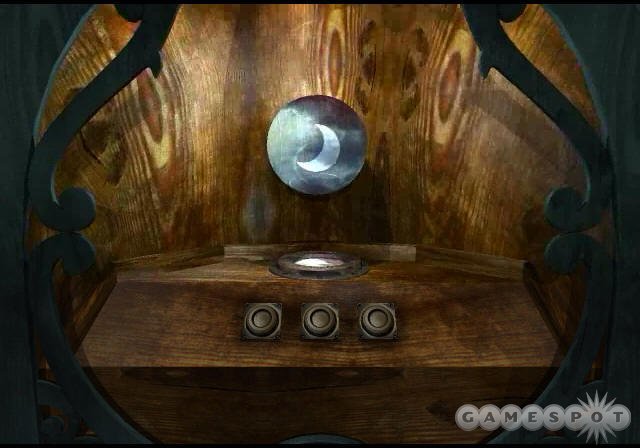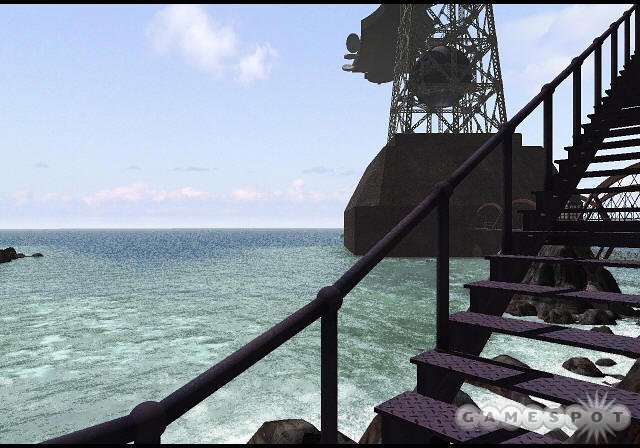It's fitting that Alida was created by a developer called Dejavu Worlds, because this point-and-click adventure will make you feel like it's 1993 all over again--the year when the seminal adventure game Myst was released. Reminiscent of Myst, Alida unceremoniously plops you down on a deserted island filled with puzzles composed of strange and elaborate machinery. In Alida, you're expected to solve the puzzles not for any compelling reason, since story and character get short shrift, but rather simply because the puzzles are there. Not only is Alida built around one of the most tired clichés in the adventure genre (the deserted island filled with Rube Goldberg machines), but also Alida's game engine is woefully dated to boot. While old-fashioned, the graphics are nevertheless finely crafted and attractive, making them the game's one saving grace.

Alida opens with a blank screen, which is quite fitting, considering how often you'll be figuratively stumbling around in the dark. An image of the island of Alida slowly appears, accompanied by the disembodied voice of a woman with a cryptic message. She tells you that you're going to the island to look for her missing husband, Arin. This intro doesn't bother to tell you who this Arin fellow is or why on Earth you should care about him. In fact, the game never makes any successful effort to involve you emotionally or to make you feel like an integral part of a compelling drama.
At least you learn up front from the game box that the island of Alida is supposed to be an uncompleted theme park--in the shape of a gargantuan guitar--that's been financed by a hugely successful band, which is also named Alida. This actually doesn't sound quite so preposterous when you recall Michael Jackson's Neverland or Dolly Parton's Dollywood. Then again, the island of Alida doesn't remotely resemble an actual theme park with working rides and so forth, but rather, it's just a giant guitar with lots of caverns and walkways for holding needlessly obscure and arbitrary puzzles. The implausible, scanty story is slowly revealed in the driest, most uninvolving way possible--through just a few diaries and papers left lying around by the members of the band. A few, little integrated full-motion video sequences with a live actor add nothing of interest or impact.
Alida's game engine is as old-school as you can get, barring a return to text adventures. The island is presented in slide-show fashion as a series of fixed, low-res 2D scenes with occasional animations rendered in QuickTime. Today, even relatively old-fashioned adventures often let you freely pan around each discrete area for added immersion and realism.
In Alida, a context-sensitive cursor lets you move between scenes, turn in a few directions, and manipulate objects. However, the forward cursor appears even when you can't actually move forward, resulting in some needless clicking on your part as you try to determine exactly where you can move. In fact, lots of needless clicking weighs down the whole game, thanks to the huge amount of backtracking required to both find clues and operate machines that are scattered across the island. The fact that some small machine controls are easily overlooked adds insult to injury.
Since Alida is an adventure game with precious little sense of adventure and almost nothing in the way of memorable characters or a driving story, it instead focuses almost entirely on solving one puzzle after another. They're mostly convoluted and tedious, and the game is structured so that it's often unclear which puzzle you're supposed to be working on or why. Just as bad, solving puzzles provides little if any sense of reward. You might not even know at first that you've actually solved some puzzles, which can lead to even more frustrating backtracking. On the bright side, the puzzles do at least tend to have an internal logic, however confusing at first. Also, some guitarists might be amused by the way puzzles revolve around operating the giant guitar's control knobs, tuning pegs, and so forth from the inside.

For all of Alida's major faults, its visuals are nicely nuanced, particularly considering the game was largely created by just one man. It's true that the graphics are mostly static 2D images that are limited to a maximum resolution of 800x600. However, the few animations you see--like a wild ride in a futuristic vehicle over the nearby ocean--are memorable. Even more impressive are the finely detailed textures, with countless, subtly varied types of wood, metal, and stone. Attractive little details, like the way colored lights flicker around a holographic sphere, add to the atmosphere. Simple but reasonably effective audio helps too, but it's striking that there's so little music--and none that's remotely memorable--in a game about a band and a giant guitar.
As an adventure game, Alida is a bust. As a puzzle game, it's certainly challenging. However, it's often more frustrating than fun, because it frequently serves up confusion and busywork instead of rewarding, reasonable puzzles tied to a strong, dramatic story. Alida's one notable quality is the fine craftsmanship of its visuals, which at least make the game fun to look at even when it's not fun to play. But then again, when was the last time you bought a game just for finely detailed textures?